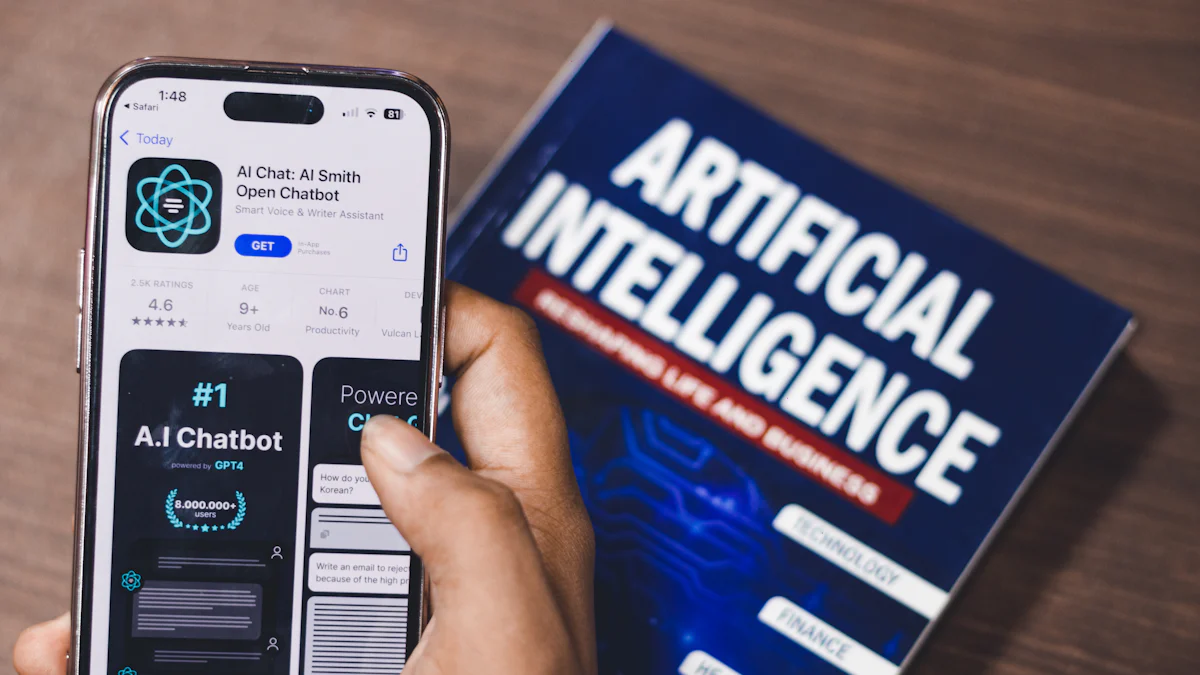Beyond Content Wrting: AI and Emerging Tech Success Stories

Artificial Intelligence (AI) and the adaptation of emerging technologies around AI possess transformative potential. Many organizations have adopted AI, with 55 percent integrating it into their operations. Real-world success stories highlight the impact of AI across various industries. For instance, manufacturing businesses using AI perform 12 percent better. The adaptation of AI can boost employee productivity by approximately 40 percent by 2035. These examples set the stage for a detailed exploration of specific success stories beyond content.
Adaptation of AI in Healthcare

Revolutionizing Diagnostics
AI-Powered Imaging
AI-powered imaging has transformed medical diagnostics. Radiologists now use AI algorithms to analyze medical images with unprecedented accuracy. AI systems detect anomalies in X-rays, MRIs, and CT scans faster than traditional methods. This technology reduces human error and speeds up diagnosis. For example, AI can identify early signs of diseases like cancer, allowing for timely intervention.
Predictive Analytics for Disease Prevention
Predictive analytics plays a crucial role in disease prevention. AI models analyze patient data to predict potential health issues. Hospitals use these predictions to implement proactive care strategies. This approach reduces hospital readmissions and improves patient outcomes. For instance, AI-driven predictive analytics help in identifying patients at risk of chronic diseases, enabling personalized preventive measures.
Enhancing Patient Care
Virtual Health Assistants
Virtual health assistants enhance patient care by providing 24/7 support. These AI-powered tools answer patient queries, schedule appointments, and offer medication reminders. Patients receive immediate assistance without waiting for human intervention. Virtual assistants also monitor patient vitals in real-time, alerting healthcare providers to any abnormalities.
Personalized Treatment Plans
Personalized treatment plans have become more effective with AI integration. AI analyzes patient history, genetic information, and lifestyle factors to recommend tailored treatments. This approach ensures that patients receive the most suitable therapies. Personalized plans improve recovery rates and reduce adverse reactions. For example, AI helps oncologists design specific treatment regimens for cancer patients based on individual profiles.
Adaptation of AI in Finance
Fraud Detection and Prevention
Real-Time Transaction Monitoring
AI has revolutionized fraud detection in finance. Companies like PayPal and Stripe use AI for real-time fraud detection. These systems analyze transaction patterns and user behavior. AI identifies suspicious activities instantly. This reduces the risk of fraudulent transactions. Financial institutions benefit from enhanced security measures.
Behavioral Analysis
Behavioral analysis plays a crucial role in fraud prevention. AI algorithms monitor user behavior to detect anomalies. Mastercard and PayPal employ these techniques. AI systems flag unusual activities for further investigation. This proactive approach minimizes potential losses. Financial firms maintain trust with their customers through these advanced methods.
Investment and Trading
Algorithmic Trading
Algorithmic trading has transformed the investment landscape. AI models execute trades based on predefined criteria. High-frequency trading relies on these algorithms. Investors gain a competitive edge through rapid decision-making. AI reduces human error and emotional biases. This leads to more profitable trading strategies.
Robo-Advisors
Robo-advisors offer cost-effective investment solutions. These AI-driven tools provide personalized financial advice. Investors receive tailored portfolio recommendations. Robo-advisors eliminate the need for traditional financial advisors. This democratizes access to investment opportunities. Users benefit from lower fees and improved returns.
Adaptation of AI in Retail

Personalized Shopping Experiences
Recommendation Engines
Amazon's recommendation engine has revolutionized personalized shopping experiences. AI algorithms analyze customer behavior and purchase history. The system suggests products that align with individual preferences. This approach drives a significant portion of Amazon's sales. Retailers benefit from increased customer engagement and higher conversion rates.
Customer Sentiment Analysis
Customer sentiment analysis leverages AI to understand consumer opinions. Retailers use natural language processing to analyze reviews and social media posts. This technology identifies trends and customer preferences. Businesses adjust their strategies based on these insights. Improved customer satisfaction leads to brand loyalty and repeat purchases.
Supply Chain Optimization
Inventory Management
AI-driven inventory management systems automate tasks related to inventory control. Retailers optimize inventory levels and reduce carrying costs. These systems predict demand and manage stock efficiently. Automated processes simplify retail operations. Retailers experience fewer stockouts and overstock situations.
Demand Forecasting
Demand forecasting uses AI to predict future sales trends. Retailers analyze historical data and market conditions. Accurate forecasts help businesses plan their inventory and production schedules. This approach minimizes waste and maximizes profitability. Companies stay competitive by meeting customer demand promptly.
Adaptation of AI in Manufacturing
Smart Factories
Predictive Maintenance
Manufacturers have embraced predictive maintenance to enhance operational efficiency. AI systems analyze equipment data to predict potential failures. This proactive approach reduces downtime and maintenance costs. For example, factories using AI can schedule maintenance before a breakdown occurs. This strategy ensures continuous production and minimizes disruptions.
Quality Control
AI-driven quality control systems have revolutionized manufacturing processes. These systems inspect products with high precision. AI algorithms detect defects that human eyes might miss. This technology ensures consistent product quality. Manufacturers benefit from reduced waste and higher customer satisfaction. For instance, AI can identify minute flaws in automotive parts, ensuring safety and reliability.
Automation and Robotics
Collaborative Robots (Cobots)
Collaborative robots, or cobots, work alongside human workers. These robots handle repetitive tasks, freeing humans for more complex duties. Cobots increase productivity and reduce the risk of workplace injuries. Manufacturers use cobots for tasks like assembly, packaging, and material handling. This integration leads to a more efficient and safer work environment.
Automated Production Lines
Automated production lines have transformed manufacturing efficiency. AI-powered robots perform tasks with speed and accuracy. This automation reduces human error and increases output. Factories achieve higher production rates and lower operational costs. For example, automotive manufacturers use automated lines for welding and painting. This results in faster production cycles and consistent quality.
Adaptation of Emerging Technologies Around AI
AI Beyond Content
AI in Marketing
Marketing professionals have embraced Artificial Intelligence beyond content to enhance their strategies. AI analyzes behavioral, transactional, and demographic data to create better interactions with prospects and customers. Kelly J Waffle, an expert in marketing automation, stated that AI will make marketing more targeted, predictable, and actionable for all levels of marketers. AI-driven tools optimize keyword targeting, landing page design, and social media scheduling. Companies like Unbounce leverage machine learning to design high-conversion landing pages, merging insights with existing data for better campaign results.
AI also revolutionizes user experience in e-commerce stores. Zsuzsa Kecsmar, an expert in e-commerce marketing, highlighted the trend of using AI in loyalty marketing. AI creates different cohorts from loyalty members and sends personalized offers. This approach mobilizes loyalty members and drives better results. AI technology extends to email marketing and personalized product recommendations, enhancing overall marketing effectiveness.
AI in Customer Service
Customer service has seen significant improvements through the adaptation of emerging technologies around AI. AI-powered chatbots provide 24/7 support, answering queries and resolving issues instantly. These chatbots handle repetitive tasks, allowing human agents to focus on complex problems. This integration leads to faster response times and higher customer satisfaction.
AI also assists in sentiment analysis, understanding customer emotions through natural language processing. Companies analyze feedback from various channels to identify trends and improve service quality. AI-driven insights help businesses tailor their responses and strategies, ensuring a positive customer experience.
Ed Fry, an expert in marketing technology, emphasized the importance of leveraging AI data from various sources. AI systems analyze vast amounts of customer interactions to predict future needs and preferences. This proactive approach enhances customer engagement and loyalty.
AI has revolutionized various industries with remarkable success stories. In healthcare, AI-powered imaging and predictive analytics have enhanced diagnostic accuracy and patient care. Finance has seen improved fraud detection and investment strategies through real-time monitoring and algorithmic trading. Retail benefits from personalized shopping experiences and optimized supply chains. Manufacturing enjoys increased efficiency with smart factories and collaborative robots.
The overarching benefits of AI include increased productivity, reduced costs, and enhanced decision-making. Professionals should consider how AI can transform their fields. The future of AI and emerging technologies looks promising, offering endless possibilities for innovation and growth.
See Also
Harnessing the Potential of Generative AI for Digital Innovation
